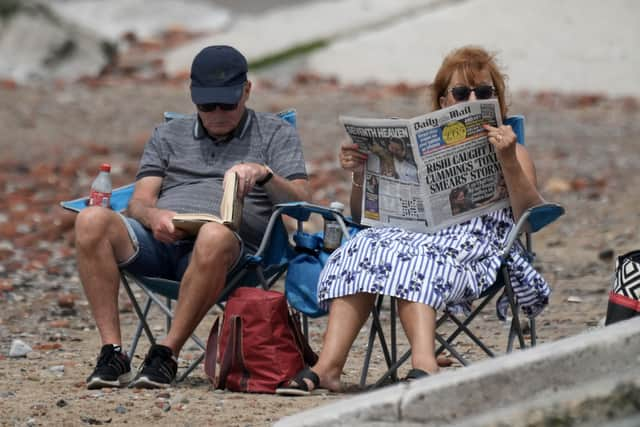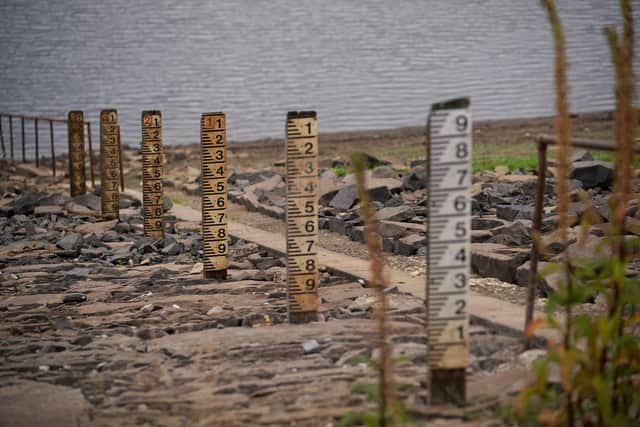Liverpool weather: This is the exact date the heatwave will return, according to the Met Office
and live on Freeview channel 276
With hose pipe bans in place around the UK and the weather starting to creep back into the less-than-comfortable warmer temperatures, Liverpool is one of those areas where the heat level has once again started to climb.
The Met Office earlier today (August 9) has now issued an amber alert for parts of the UK, with Liverpool now on an extreme heat warning from Thursday to Sunday.
Advertisement
Hide AdAdvertisement
Hide AdThough no hose pipe ban has been confirmed yet in the North West, Liverpool residents can expect a big difference in temperatures this week compared to last week - and yes, the Met Office are expecting Liverpool to meet their definition of a heatwave.
How hot will it get in Liverpool this week?


Though nothing reaching over the 30°C mark this week is expected, according to the Met Office, the weather does get very close to that mark.
The hottest Liverpool will get is 27°C across three days towards the end of the week, with the lowest temperature a mere 15°C on Tuesday at its coolest.
As the Met Office has determined that a heatwave in the North-West is any consistent temperature for three days or more over the 25°C threshold, Liverpool can now expect the heatwave to arrive later this week.
Advertisement
Hide AdAdvertisement
Hide AdWhen will the heatwave arrive in Liverpool?
Liverpool is expected to reach those 27°C temperatures on Thursday (11 August), Friday (12 August) and Saturday (13 August), leading into a drop into a cooler 26°C on Sunday (14 August).
What does the rest of the week look like in Liverpool?
The Met Office have forecast that across the next five days:
- Tuesday - sunny intervals changing to cloudy by lunchtime (22°C)
- Wednesday - sunny (24°C)
- Thursday - sunny (27°C)
- Friday - sunny (27°C)
- Saturday - sunny (27°C)
- Sunday - sunny, changing into cloudy in the afternoon (26°C)
What is the long-range forecast for Liverpool?
The long-range forecast from the Met Office has stated: “The start of the period will likely be fine and sunny for most. Cloud and outbreaks of light rain may be seen in the far northwest on Friday, along with possible coastal mist or fog. Winds are expected to be mostly light and temperatures above average, becoming warm in the north and hot in the south.”
“Into the weekend and through next week, mainly dry and settled weather will likely continue for most. The north is expected to see the most of any precipitation, but there is also a low risk of thunderstorms developing in the south”.
Advertisement
Hide AdAdvertisement
Hide Ad“Temperatures will likely be very warm, locally hot for much of England and Wales, especially across the southern parts, but closer to normal while still warm elsewhere.”
Will Liverpool now receive a hose pipe ban?


United Utilities, who take care of water management across the North-West, have still determined that there will be no need for a hose pipe ban, despite the returning drier weather.
"Overall water resources are at nearly 70% and we are not considering any restrictions. Whatever the weather, we always encourage people to use water wisely, which saves energy and money and is good for the environment” a spokesperson for United Utilities said.
They once again suggested the following ways to conserve water though, including:
Advertisement
Hide AdAdvertisement
Hide Ad- Washing up using a bowl
- Only fill the kettle with the amount of water needed
- Using mulch for gardens rather than sprinklers
- Spending less than a minute having a shower
- Turning off the tap when brushing your teeth
- If you must water your garden, use a watering can and water your plants early morning or late evening.
What is an amber weather alert?
An amber alert is issued by the Met Office when there is an increased likelihood of impacts from severe weather, which could potentially disrupt your plans. This means there is the possibility of travel delays, road and rail closures, power cuts and the potential risk to life and property.
The Met Office consider Liverpool’s amber alert warning to mean:
- Adverse health effects are likely to be experienced by those vulnerable to extreme heat
- The wider population are likely to experience some adverse health effects including sunburn or heat exhaustion (dehydration, nausea, fatigue) and other heat related illnesses
- Some changes in working practices and daily routines likely to be required
- An increased chance that some heat-sensitive systems and equipment may fail.
- More people are likely to visit coastal areas, lakes, rivers and other beauty spots leading to an increased risk of water safety and fire-related incidents.
- Some delays to road, rail and air travel are possible, with potential for welfare issues for those who experience prolonged delays
What is a heatwave?
A heatwave is an extended period of hot weather relative to the expected conditions of the area at that time of year, which may be accompanied by high humidity.
A UK heatwave threshold is met when a location records a period of at least three consecutive days with daily maximum temperatures meeting or exceeding the heatwave temperature threshold.
The threshold varies by UK county.
Advertisement
Hide AdAdvertisement
Hide AdHeatwaves are most common in summer when high pressure develops across an area. High pressure systems are slow moving and can persist over an area for a prolonged period of time, such as days or weeks.
They can occur in the UK due to the location of the jet stream, which is usually to the north of the UK in the summer. This can allow high pressure to develop over the UK resulting in persistent dry and settled weather
Comment Guidelines
National World encourages reader discussion on our stories. User feedback, insights and back-and-forth exchanges add a rich layer of context to reporting. Please review our Community Guidelines before commenting.
